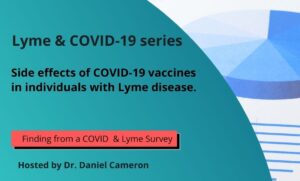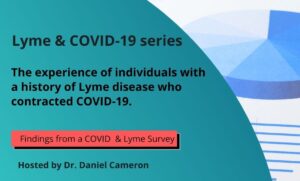Call for your appointment today 914-666-4665 | Mt. Kisco, New York

Patients with chronic Lyme disease have reported symptoms of PTSD. Now, an article entitled “PTSD as the second tsunami of the SARS-Cov-2 pandemic,” by Dutheil et al. indicates that some COVID-19 patients are experiencing post-traumatic stress disorder, as well.¹
The authors highlight several observations on the SARS-Cov-2 pandemic and PTSD that would also apply to Lyme disease patients that I have seen in my practice.
PTSD in COVID-19 pandemic
- “With a poor understanding of viruses and spreading mechanisms, the evocation of SARS is generating a great anxiety contributing to promote PTSD.”
- “In the families of cases, the brutal death of family members involved a spread of fear and a loss of certainty, promoting PTSD.”
- “PTSD symptoms involve chronic severe anxiety with re-experiencing the traumatic event, flashbacks, nightmares, increased arousal, and reduced social life.”
- “People suffering from PTSD are prone to not seek care, because of barriers such as lack of information and cost of mental health care, being afraid of stigmatization, or beliefs that symptoms may increase with time.”
- “PTSD individuals are more at-risk of suicidal ideation, suicide attempt, and deaths by suicide, in huge proportions.”
PTSD in chronic Lyme disease
- The poor understanding of Lyme disease and associated tick-borne illnesses has generated a great deal of anxiety.
- The severity of chronic illness following Lyme disease involves a spread of fear and a loss of certainty.
“People suffering from PTSD are prone to not seek care, because of barriers such as lack of information and cost of mental health care, being afraid of stigmatization, or beliefs that symptoms may increase with time.”
- I have Lyme disease patients who re-experience the traumatic event, flashbacks, nightmares, increased arousal, and reduced social life, as described by the authors.
- I have seen Lyme disease patients who “are prone to not seek care, because of barriers such as lack of information and cost of mental health care, being afraid of stigmatization, or beliefs that symptoms may increase with time.”
- I have seen suicidal ideation in patients I have treated. Dr. Robert Bransfield, a psychiatrist specializing in tick-borne illnesses, has described suicidal ideation, suicide attempt, and deaths by suicide in patients in his practice.²
Author’s perspective: I hope that a better understanding of post-traumatic stress disorder in COVID-19 patients will lead to a better understanding of PTSD in Lyme disease.
Related Articles:
Lyme carditis diagnosis during a COVID-19 quarantine
References:
- Dutheil F, Mondillon L, Navel V. PTSD as the second tsunami of the SARS-Cov-2 pandemic. Psychol Med. Apr 24 2020:1-2. doi:10.1017/S0033291720001336
- Bransfield RC. Aggressiveness, violence, homicidality, homicide, and Lyme disease. Neuropsychiatr Dis Treat. 2018;14:693-713. doi:10.2147/NDT.S155143



